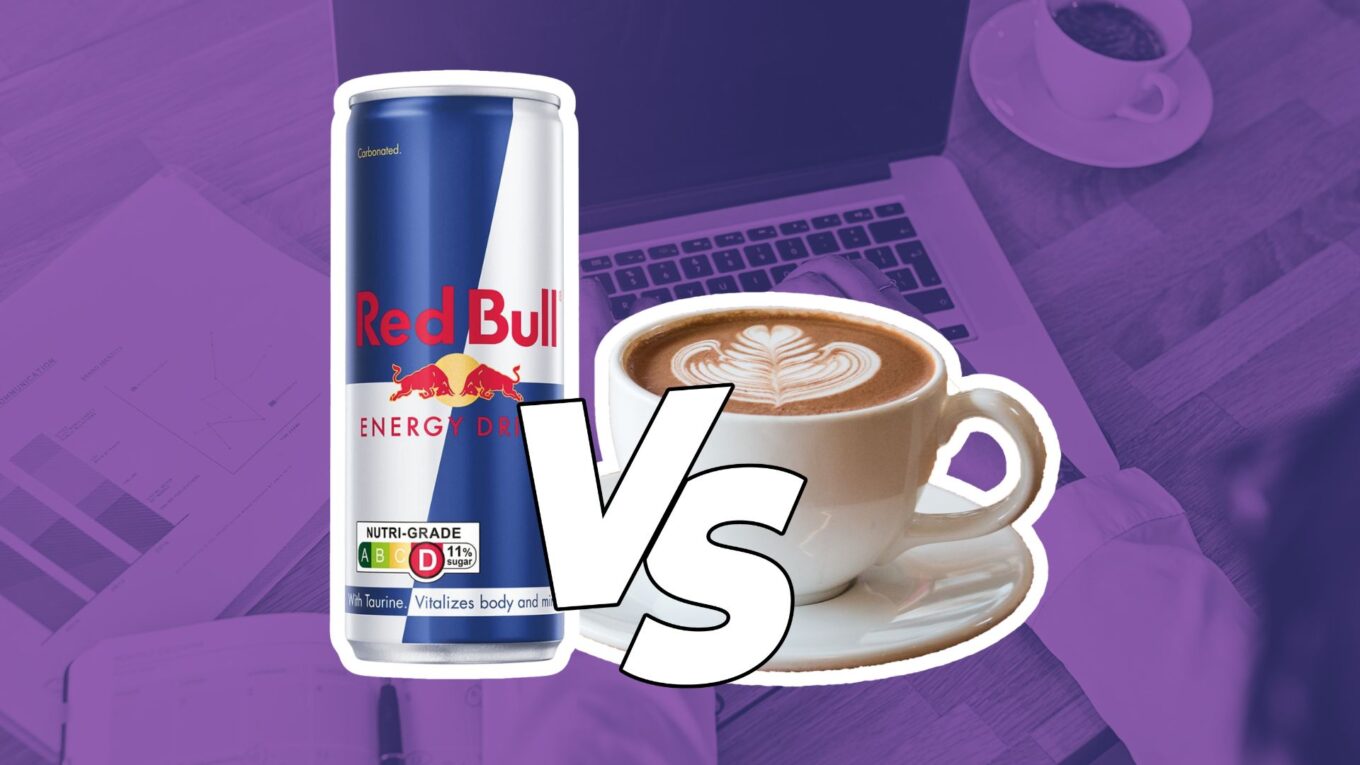Need a boost at work? You’re not alone. Many people rely on caffeine and often weigh coffee vs Red Bull. These popular drinks claim to improve focus and increase energy, but which one works?
Picture enjoying a warm coffee or opening a cold Red Bull. Both offer a quick lift, but their impact on productivity might be unexpected.
Whether you prefer coffee or energy drinks, knowing how these beverages affect your body and mind is crucial for improving your work output.
Are you curious which drink is better for productivity? Let’s examine coffee and Red Bull, as well as their ingredients, effects, and possible downsides.
Coffee vs Red Bull

Let’s start by exploring the basics of our contenders. We’ll look at what makes coffee and Red Bull unique, from their origins to their key ingredients.
The Classic Brew: Coffee’s Rich History
Coffee has been a staple drink for centuries. It’s made from roasted coffee beans, typically served hot. People worldwide enjoy coffee for its taste and energizing effects.
Coffee is mostly water and natural coffee compounds. The key ingredient is caffeine, a natural stimulant. It also contains small amounts of vitamins and minerals.
The New Kid on the Block: Red Bull’s Rise to Fame
Red Bull entered the market in the 1980s and quickly gained popularity. It’s a carbonated drink sold in distinctive slim cans. Many people choose Red Bull for quick energy boosts.
Red Bull contains water, sugar, and caffeine. It also contains synthetic additives like taurine and B vitamins, which aim to provide extra energy and mental clarity.
Caffeine Content and Absorption
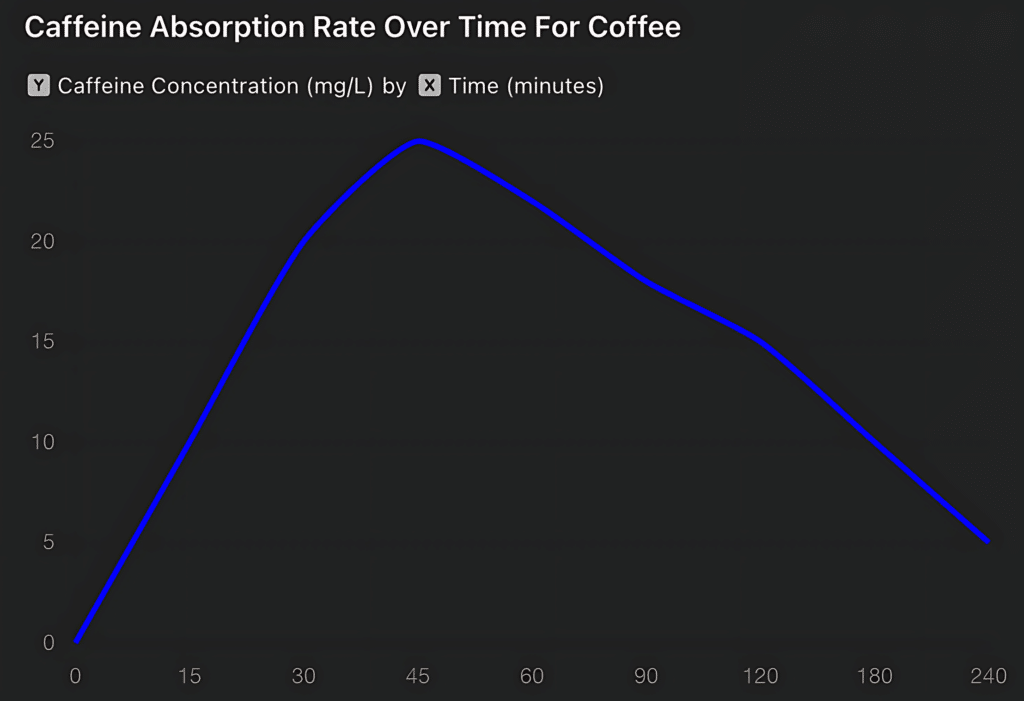
In this section, we’ll compare how much caffeine is in coffee and Red Bull, and how your body processes it differently from each drink.
Coffee: A Steady Stream of Caffeine
The amount of caffeine in coffee can vary, but on average, a typical 8-ounce cup contains about 95 milligrams. This can change based on the type of coffee and how it’s brewed.
When you drink coffee, your body absorbs the caffeine slowly. This leads to a gradual increase in energy levels that can last several hours.
Many find this provides a more consistent feeling of alertness throughout the day.
Red Bull: A Quick Caffeine Kick
A standard 8.4-ounce can of Red Bull contains about 80 milligrams of caffeine. This is slightly less than an average cup of coffee, but the difference in how it affects you is notable.
Red Bull is designed for fast absorption. When you drink it, the caffeine enters your bloodstream quickly.
This results in a rapid boost of energy. However, this quick spike can also lead to a faster decline in energy levels than coffee.
Duration and Quality of Energy Boost
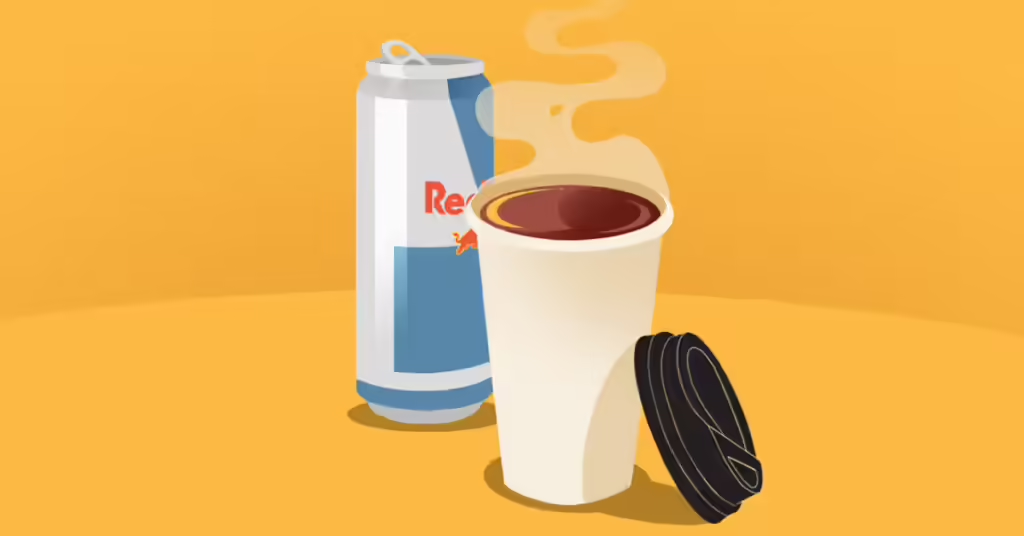
How long will your energy last? We’ll examine the energy patterns of coffee and Red Bull to see which might keep you going longer.
Coffee: The Marathon Runner
Coffee typically provides a longer-lasting energy boost. Its caffeine can keep you alert for 4-6 hours after drinking.
This extended effect helps maintain steady energy levels throughout your workday.
As the caffeine wears off, you’ll likely experience a gradual decline in energy. This slow tapering often means you’re less likely to feel a sudden drop in alertness or productivity.
Many people find this gentle comedown more manageable and less disruptive to their work.
Red Bull: The Sprinter
Red Bull offers an immediate energy surge. You might feel more alert and focused within 10-15 minutes of drinking it.
This quick boost can be helpful for short-term tasks or when you need to wake up fast.
However, Red Bull’s energy may not last as long as coffee’s. The high sugar content can lead to a sharp energy crash about 1-2 hours after consumption.
This sudden drop might leave you feeling more tired, potentially affecting your productivity for the rest of the day.
Impact on Cognitive Functions
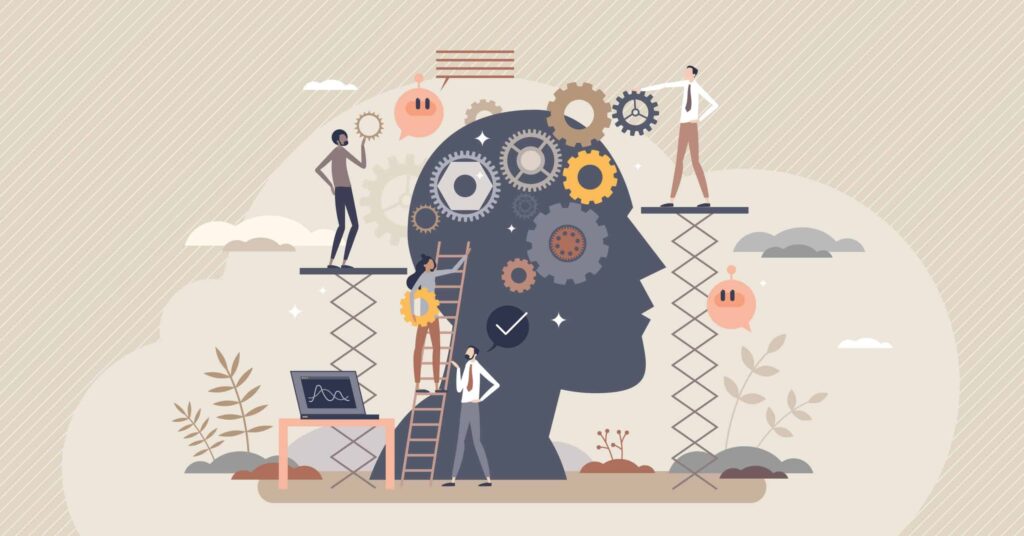
It’s not just about staying awake. Here, we’ll study how coffee and Red Bull affect your brain function and overall mental performance.
Coffee: Brain’s Best Friend
Coffee has been shown to improve various aspects of brain function. Regular coffee drinkers often report better focus, improved memory, and enhanced cognitive performance.
These benefits can last for several hours after drinking coffee.
Coffee contains natural compounds called antioxidants. These substances may protect brain cells from damage and could support long-term brain health.
Some studies suggest regular coffee consumption might lower the risk of certain brain disorders.
Red Bull: Quick Mental Spark
Red Bull can increase alertness and concentration rapidly. This quick boost might help you tackle tasks that require immediate mental sharpness.
Many people use Red Bull when they need to stay awake and focused for short periods.
However, Red Bull’s high sugar content can have drawbacks. After the initial boost, blood sugar levels may drop, potentially leading to reduced cognitive function.
This “sugar crash” might make it harder to concentrate or make decisions, affecting overall productivity.
Health Implications
What happens when you make coffee or Red Bull a habit? This section looks at the potential health effects of regular consumption of each drink.
Coffee: A Cup of Potential Benefits

When consumed in moderation, coffee is often linked to positive health outcomes. Regular coffee drinkers may have a lower risk of certain health issues.
Some studies suggest coffee might help protect against type 2 diabetes and liver problems.
However, too much coffee can have downsides. Drinking large amounts may lead to feeling jittery or anxious. It can also disrupt sleep if consumed late in the day.
These effects can vary from person to person, so it’s important to know your limits.
Red Bull: A Can of Caution
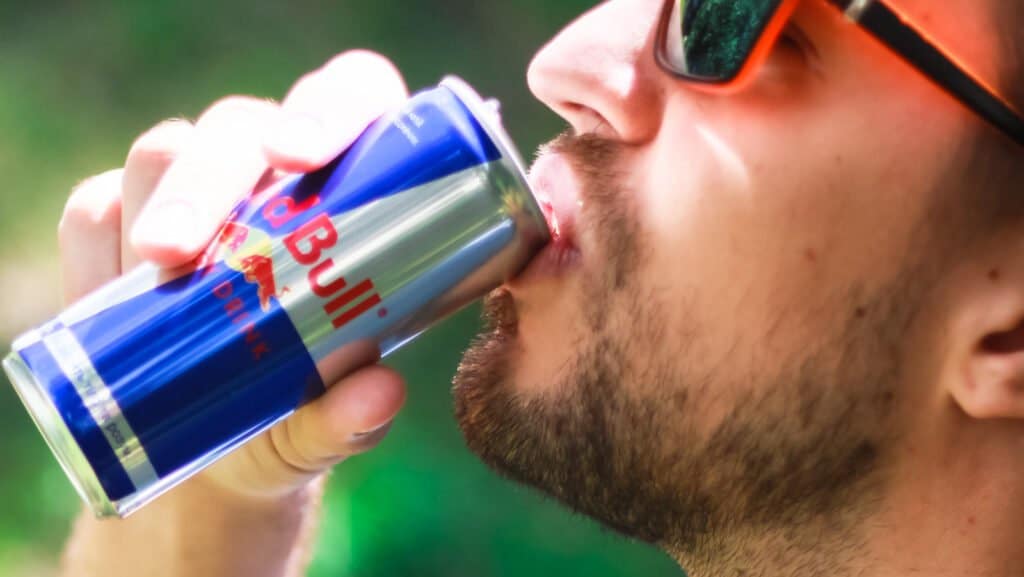
Red Bull’s high sugar content and added ingredients raise some health concerns. A single can contain significant sugar, contributing to weight gain and tooth decay if consumed regularly.
Drinking Red Bull may cause a rapid increase in heart rate and blood pressure. While these effects are usually temporary, they could be risky for people with heart conditions.
Long-term heavy use of energy drinks like Red Bull might lead to metabolic issues. It’s wise to consume these drinks sparingly and be aware of how your body responds.
Practical Considerations for Productivity

Beyond the biological effects, we’ll explore how coffee and Red Bull fit into your daily routine and work environment.
Coffee: Flexible Fuel for Your Workday
Coffee offers versatility in how you prepare and consume it. You can brew it at home, grab it from a coffee shop, or use instant coffee at work.
This flexibility allows you to fit coffee into your schedule easily.
You can customize coffee to suit your taste and energy needs. You might prefer a strong espresso for a quick boost or a milder latte for sustained energy.
You can adjust the strength, add milk or sweeteners, or drink it black. This customization lets you fine-tune your caffeine intake throughout the day.
Red Bull: Ready When You Are
Red Bull excels at convenience for on-the-go consumption. You can easily grab a can from a store or vending machine when you need a quick energy boost.
There’s no preparation time, making it handy for busy schedules or unexpected energy slumps.
Each can of Red Bull provides a consistent taste and energy effect. You know exactly what to expect in terms of caffeine content and flavor.
This standardization can be helpful when you need a reliable energy source without surprises.
Personal and Situational Preferences

In this final section, we’ll discuss how personal factors and specific situations might influence your choice between coffee and Red Bull.
Coffee: The Steady Companion
Coffee is often the choice for those who want a balanced, steady energy boost. It’s popular among people who need to maintain focus and productivity over longer periods.
Many office workers, students, and professionals rely on coffee to get through their day.
Coffee works well for long-term productivity needs. Its gradual release of caffeine can help you stay alert and focused for several hours.
This makes it suitable for tasks that require sustained attention, like writing reports, studying, or working on complex projects.
Red Bull: The Quick Fix
Red Bull is typically chosen by individuals needing an immediate and intense energy lift. It’s popular among people who face sudden energy dips or need to be alert quickly.
You might see athletes, night shift workers, or students reaching for a Red Bull during exam periods.
This energy drink can be useful for short bursts of high productivity. If you have a tight deadline, need to power through a late-night project, or want to stay awake during a long drive, Red Bull might provide the quick boost you’re looking for.
However, it’s important to be mindful of the potential energy crash that may follow.
Conclusion
Regarding coffee vs Red Bull, there’s no one-size-fits-all answer for productivity. Your choice depends on your personal needs and work situation.
Coffee offers a steady, long-lasting energy boost and potential health benefits when consumed in moderation. It’s ideal for sustained productivity throughout the day.
Red Bull provides a quick energy surge, which is useful for short-term tasks or immediate alertness. However, be mindful of its sugar content and potential crash.
When choosing between coffee and Red Bull, consider your work style, health, and energy needs. Remember, moderation is key with both beverages.
Ultimately, the best drink for productivity is the one that works well for you without negative side effects. Listen to your body and adjust your choice accordingly.

